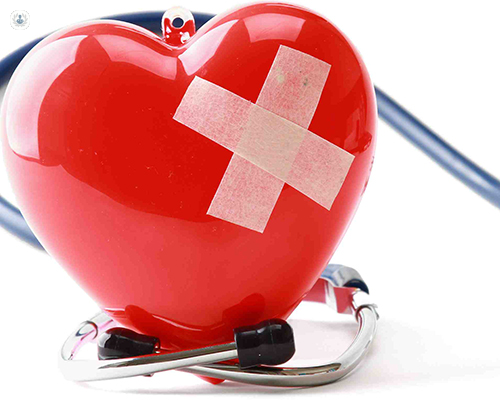Angina: types and treatment methods
Written in association with:Angina is chest pain that happens when the heart muscle doesn’t get enough blood and oxygen This condition typically results in a tight, squeezing, or heavy feeling in the chest. For some, the pain may also radiate to the shoulders, arms, neck, jaw, or back. Angina itself is not a heart attack, but it is often a warning sign that the heart is under strain, potentially due to underlying coronary artery disease (CAD), where the arteries supplying blood to the heart become narrowed.
Angina is a common symptom and can vary in intensity and duration. Leading consultant cardiologist Dr Sudhakar George helps us to understand the nature of angina, as well as its potential triggers and treatment options, can help individuals manage this condition and reduce their risk of complications.

What causes angina?
The primary cause of angina is reduced blood flow to the heart muscle, which occurs most often due to coronary artery disease. In CAD, plaques (made up of fat, cholesterol, and other substances) build up in the coronary arteries, creating blockages or narrowing that restricts blood flow. When the heart muscle does not receive enough oxygen-rich blood, especially during physical activity or stress, angina symptoms may arise.
Other causes, though less common, include coronary artery spasm, where the coronary arteries tighten temporarily, reducing blood flow. This form of angina is called variant or Prinzmetal’s angina and can occur at rest.
What are the types of angina?
Angina can be classified into two main types: stable and unstable angina.
- Stable Angina: This is the most common form and occurs predictably, often during physical exertion or emotional stress. It usually lasts a few minutes and subsides with rest or medication. Stable angina indicates the presence of coronary artery disease but is generally manageable with lifestyle changes and treatment.
- Unstable Angina: This type is more serious and can occur without warning, even at rest. Unstable angina may last longer, worsen over time, and may not be relieved by rest or medication. It requires immediate medical attention, as it may indicate a higher risk of a heart attack.
How is angina diagnosed?
To diagnose angina, doctors typically start with a thorough medical history and physical examination. Common diagnostic tests include:
- Electrocardiogram (ECG): This test records the heart’s electrical activity and can detect abnormalities suggesting reduced blood flow to the heart.
- Stress test: During a stress test, patients walk on a treadmill or use another form of exercise while their heart is monitored to observe how it responds under stress.
- Coronary angiography: In this test, a special dye is injected into the coronary arteries, allowing X-ray imaging to detect any blockages or narrowings.
What treatments are available for angina?
The goal of angina treatment is to relieve symptoms and lower the risk of heart attacks.
Options may include:
- Medications: Commonly prescribed medications include nitrates (to relax the coronary arteries), beta-blockers (to reduce heart rate and blood pressure), and statins (to lower cholesterol).
- Lifestyle Changes: Lifestyle modifications, such as a heart-healthy diet, regular exercise, quitting smoking, and managing stress, are essential in reducing angina episodes.
- Surgical Procedures: In more severe cases, procedures such as angioplasty, where a balloon is used to open narrowed arteries, or coronary artery bypass grafting (CABG) may be recommended.
When should you seek help?
If you experience chest pain that is new, occurs at rest, or worsens over time, it is essential to seek medical attention promptly. Angina, especially unstable angina, can indicate an increased risk of heart attack, so early assessment and treatment are vital for heart health.
If you would like to book a consultation with Dr George, visit his Top Doctors profile today.


